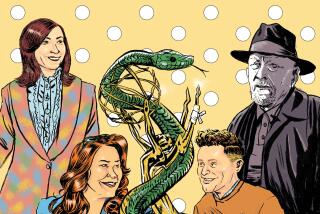‘Mad Men’ recap: The Valentine’s Day massacre
“Mad Men” is almost always more successful when it approaches Important Social Issues obliquely rather than head-on. Last year’s “The Flood” was widely panned for its awkward and heavy-handed depiction of Martin Luther’s King’s assassination and its aftermath. In contrast, “A Day’s Work” may be the smartest, most sensitive this show has ever been on the subject of race, mostly because on the surface it’s not about race at all, but rather an almost farcical chain of events set off by a bouquet of flowers. Both as drama and as history lesson, seeing how white people treat African Americans on an average workday is far more instructive than listening to them ruminate about race relations in the wake of a national tragedy.
The entire episode takes place on Valentine’s Day, 1969. Whether it’s Christmas, Thanksgiving or New Year’s Eve, holidays are always an interesting time on “Mad Men,” and in this case, a day dedicated to love -- or at least to selling candy -- becomes an ironic device for showing us that just about every white person at Sterling Cooper & Partners is, if not an outright bigot, then at least kind of a complicit jerk.
It all begins when Peggy mistakenly assumes a mysterious bouquet of flowers was sent to her by Ted. In reality, they are a gift to Shirley from her fiance, but she decides not to point out Peggy’s error. As Dawn advises her over coffee in the break room, “Keep pretending. That’s your job.” Dawn is, on a literal level, referring to Shirley’s job as Peggy’s secretary, but she’s also, however implicitly, talking about her “job” as a black woman.
PHOTOS: Preview Season 7 of ‘Mad Men’
Despite the obvious personality differences between Shirley and Dawn-- their contrasting outfits tell you everything you need to know on that front -- they share a profound connection by virtue of the fact they they are black women working in a white, male-dominated world. And Dawn, who we sense is the more experienced veteran here, is essentially advising her not to rock the boat. It’s almost impossible to imagine a male character, or even a white woman like Joan or Peggy, voluntarily relinquishing a gift from a loved one in order to avoid a few seconds of awkwardness.
But that’s what Shirley does, and it backfires spectacularly. Humiliated, Peggy lashes out and demands that Joan find her a replacement. No, Peggy doesn’t say or do anything explicitly racist, but she treats Shirley as utterly disposable, and her reaction is almost certainly heightened by the awareness that she’s unintentionally been made a fool by her secretary, a black woman of much lower professional status who also happens to be engaged. Shirley has something Peggy wants, and is punished for it.
Meanwhile, Dawn also finds herself at the receiving end of some ugly, racially charged behavior at the hands of Lou Avery, who is rapidly emerging as the most thoroughly loathsome character to date on “Mad Men.” Unpopular characters like Betty and Duck are usually more pathetic than truly despicable, but Lou, on the other hand, is the absolute worst. Don’t let the Mr. Rogers cardigan fool you: He’s King Joffrey in baby blue mohair. (I beg you, Matt Weiner, please don’t try to make Lou sympathetic by revealing his wife is dying of cancer or something: In a morally ambiguous world, it’s refreshing to have someone to hate.)
In any case, Lou would rather have the brain-dead-but-blond Meredith as his secretary than the eminently capable Dawn. He somehow views her inability to see into the future and predict Sally’s visit to the office as impudence, even though she happens to be out buying perfume for his wife. Subject to utterly impossible demands, Dawn is doing the very best she can but is penalized for not having supernatural abilities and, as a black woman, that’s the only way she could possibly be good enough. Meredith, meanwhile, is able to fail upward with comical ease. Lou doesn’t have to use ugly epithets to make his attitude clear.
PHOTOS: The women of ‘Mad Men’
Leave it to the reliably out-of-touch Bert Cooper to act with the most overt racism. After spotting Dawn in the lobby, he immediately asks Joan to reassign her yet again. “I’m all for the national advancement of colored people, but I do not believe they should advance all the way to the front of this office,” he says, sounding a lot like many white people throughout the North in the ‘60s. If he lived in the Bronx or Brooklyn or South Boston, he might be saying, “Of course, black people should be able to vote -- but I don’t want them in my neighborhood.”
It all works out in the end, however, as Joan and Dawn both receive promotions (of a sort). Of course, this being “Mad Men,” two of the most capable employees at SCP get what they deserve not because the world is a fair, meritocratic place, but because a man in power makes a decision on a whim. In this case it’s Jim Cutler, who recognizes that Joan is working two jobs at once. It’s ironic yet somehow apt that it’s Cutler, the oblivious oddball, who realizes the obvious fact that Joan’s situation is totally untenable. She moves to a vacant office upstairs, while Dawn, with the “organization, fortitude and lack of concern for being disliked” the job requires, moves seamlessly into Joan’s place.
Now before I move on to Sally and Don’s story line -- don’t worry, I’ll get there -- a few words on Peggy. “A Day’s Work” isn’t the first time “Mad Men” has used confusion over a bouquet before to illuminate the psyche of a lead female character. As you may recall, Joan once received flowers with an intimate note intended for Lane’s wife. It was New Year’s Eve, 1964, Joan’s marriage was crumbling and her volcanic reaction represented a momentary but telling lapse in her carefully maintained facade of cool.
I might complain about “Mad Men” recycling plots except the repetition here seems intentional (after all, Joan and Peggy share an awful lot in common, right down to bearing children secretly fathered by men from the office). Peggy, in contrast to Joan, has never been as good at keeping a lid on her emotions, and her freakout is also less justified: She assumes the flowers were hers, then assumes they came from Ted -- both fairly huge leaps in logic that indicate just how distracted she is at the moment.
PHOTOS: On the set of ‘Mad Men’
But can you really blame her? She is a mess. The elevator scene with Stan and Ginsberg is perhaps a minute long, but it tells us volumes about Peggy’s current emotional state. In the space of a single elevator ride, Peggy goes from proudly assertive working woman (“You can finish tonight and have plans all weekend.”) to touchingly needy friend (“Maybe if you invite me you can have ‘til Tuesday?”) to slightly pathetic object of ridicule (she has plans to “masturbate gloomily,” jokes Ginsberg, of all people). The elevator ride is pretty much her life over the past decade condensed into 90 seconds.
In any case, I’m worried about you, Peggy. Take a week off and use some of that hard-earned salary to go somewhere sunny--anywhere but California, OK?
Now, speaking of people avoiding California, Don is still busy doing nothing, sleeping in and watching a whole lot of television as cockroaches infest his Park Avenue bachelor pad. On the bright side, at least he’s not drinking that much! His main task every day is to maintain the illusion that he’s employed, and Dawn is his most valuable accomplice, bringing him phone messages and office intelligence at the end of the day. Note how Don changes out of his bathrobe before Dawn comes over, almost as if he’s trying to convince her he’s still working, though obviously she knows the truth.
Don’s also keeping up appearances around his ad-world colleagues, taking business lunches to suss out possibilities at other firms and lying -- or at least being extremely evasive -- about his status at SCP. Right now, Don is still a man in demand, but it’s only a matter of time before he’s damaged goods.
PHOTOS: Fashon of ‘Mad Men’ season six
Sally, with her knack for showing up at the exact wrong moment, is the first person outside the office to learn the truth about Don’s professional situation. She chooses not to confront her father about it immediately because, as she says later in the car, “It’s more embarrassing for me to catch you in a lie than it is for you to be lying.” A child psychologist could probably write a book on the ramifications of that sentence alone, but suffice it to say that Don’s chronic dishonesty has clearly affected his daughter’s emotional life. And while he may have told her the truth about Dick Whitman, that wasn’t enough to make her forget years of deception, or the trauma of seeing him with Sylvia.
It’s telling that the mention of this unfortunate encounter is what makes Don sympathize with his daughter. Over dinner, he admirably tries to rope her into conversation, cajoling her with fries and Coke. It’s touching to see Don try so hard to engage his daughter, but as long as she senses he’s not being forthcoming, Sally resists. As soon as he fesses up, saying he got suspended from work for saying “the wrong things to the wrong people at the wrong time,” the ice melts away, and Sally transforms from sulky teenager to compassionate listener. Wise beyond her years, Sally wonders why Don isn’t in L.A. with Megan if he’s not working, and doesn’t completely buy his explanation that he wanted to stay in New York to fix the situation. “Why don’t you just tell her that you don’t want to move to California?” she asks. For once, he doesn’t have an answer.
Theirs surely isn’t the healthiest father-daughter relationship of all time, but it’s certainly improving. If there’s hope for Don’s permanent redemption, it lies with his daughter, the only woman in his life who seems capable of holding him accountable on a long-term basis. As complicated as Don’s situation is, the solution is pretty straightforward. As Sally tells her father when he asks what to write in her excuse note, “Just tell the truth.”
Stray observations:
--Shirley looked like she was wearing one of Sally’s dresses. That thing wasn’t even close to passing the fingertip test.
--Where is Betty hiding? I need Betty!
--It only took one week, but Bitter Pete is back! He may genuinely enjoy the sunshine and the “vibrations” of California, but he really, really hates that being on the West Coast also means being out of the loop at the office. Whether this means he’ll flee back to New York or strike out on his own in California is probably the biggest question ahead for his character.
--Note Dawn’s exaggerated Peter Pan collar and schoolgirl plaid. Remind you of anyone?
--I’ve watched it a few times and I’m still not sure how to read Don’s suggestion that they ditch the restaurant without paying the tab. Was that a test of some kind? Just a weird joke? Someone please explain.
--Interesting that Don is upset that Sally went to a funeral in the city, not that she skipped out early to go shopping in the Village. He knows his daughter’s got a morbid streak.
--Joan’s claustrophobic office, with doors on both sides, is a great example of how this show uses production design to enhance the story.
ALSO:
‘Mad Men’ recap: ‘Rich in goods but ragged in spirit’
Matthew Weiner talks ‘ambitious’ final season
‘Mad Men’ cast and creator turn out for L.A. premiere
Twitter: @MeredithBlake
More to Read
The complete guide to home viewing
Get Screen Gab for everything about the TV shows and streaming movies everyone’s talking about.
You may occasionally receive promotional content from the Los Angeles Times.






